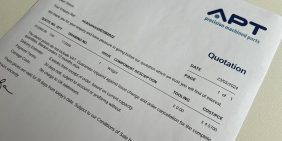Top Tips for Buyers Requesting Quotes for Turned Parts to Ensure Accurate and Timely Quotations
Navigating the process of requesting quotes for CNC turned parts can be daunting, especially for those who may not have a deep technical background in engineering. At APT, we understand the challenges buyers face and aim to make the process as smooth as possible.

Key information to include in your RFQ
These top tips on what to include in your request for quotation (RFQ) will ensure you receive accurate and timely quotes. Additionally, we’ll delve into some technical aspects of our services, as a precision turned parts manufacturer, to help you better understand the process.
1. Detailed drawings
Ensure you attach a detailed drawing or drawings of the part you need. This is crucial for us to understand the specifications and dimensions of the component. The more detailed the drawing, the more accurate the quote will be.
2. Material specification
Specify the material required for the part and its grade. Different materials can significantly affect the machining process and cost. Whether you need stainless steel 316 or 304, 6082 aluminium or 7075, CZ121 brass, or any other material, make sure to include all this information in your RFQ.
3. Quantity required
Indicate the quantity of parts required. The number of units can influence the cost per part, with larger quantities often benefiting from economies of scale.
4. Additional specifications
Include any additional specifications such as ISO standards or customer-specific requirements. This might include tolerance levels, surface finishes, or specific machining processes that need to be followed. See the next section below for more details on the technical considerations for CNC machining.
5. Full contact details
Provide your company’s full contact details including your name, email address and contact telephone number. This ensures we can get in touch with you easily for any clarifications and to send you the quote promptly.
6. How you found us
Let us know how you heard about APT Leicester. This helps us understand our reach and improve our marketing efforts.
Technical considerations for CNC machining
Understanding the technical aspects of precision turned parts and CNC machining can further enhance the accuracy of your RFQ. Below is some key points to consider:
1. Design for manufacturability
Design for Manufacturability (DFM) is a crucial aspect where APT Leicester can provide valuable assistance. Our team can offer advice on your component designs and suggest optimisations to ease the CNC machining process. Simple design adjustments can make a significant difference in the ease and cost of production. Avoid overly complex geometries that may require specialised tooling or processes and focus on creating designs that are straightforward for CNC machines to execute. This approach can reduce production time and costs of your turned parts significantly.
2. Tolerances and surface finishes
Clearly specify the required tolerances and surface finishes. Precision is paramount in CNC machining, and different applications may require different levels of precision. For instance, precision turned parts for Aerospace may need extremely tight tolerances and high-quality surface finishes, whereas components for other industries might have more lenient requirements. Be specific about your needs to ensure the final product meets your expectations. You may need to contact your technical department for clarifications if tolerances and surfaces finishes are missing from the original drawings.
3. Material selection
Material selection is critical in CNC machining. Different materials have different properties and machining requirements. Different grades of metals such as stainless steel, aluminium, and brass each have unique characteristics that can affect the machining process and the performance of the finished part. Additionally, consider the cost and availability of materials to balance performance and budget.
4. Tooling and machine capabilities
Understanding the capabilities of CNC lathes or machining centres and their respective tooling required to machine your component can help in planning the manufacturing process. Different tools are used for various operations, such as turning, drilling, milling, profiling, cross drilling, chamfering and boring. Ensure that your design takes into account the limitations and strengths of the available machinery to optimise production efficiency.
5. Batch size and production volume
The size of your production run can influence the cost and method of manufacturing. Small batch sizes might be more suitable for prototyping and low-volume production, while larger runs can benefit from economies of scale. Consider blanket orders delivery if you are looking for bulk pricing, components are dispatched as needed over a 12-month period. Communicate your expected production volume clearly to ensure the quote accurately reflects the manufacturing process and costs.
Ensuring successful quotes and future collaboration
By including detailed drawings, material specifications, quantity required, additional specifications, full contact details, and information on how you found us, you can ensure a smooth and accurate quoting process. At APT Leicester, we are committed to providing high-quality precision turned parts and CNC machining services and look forward to helping you with your turned parts needs.
For more information or to request a quote, please contact us. Our team is always ready to assist you in achieving the best results for your projects.